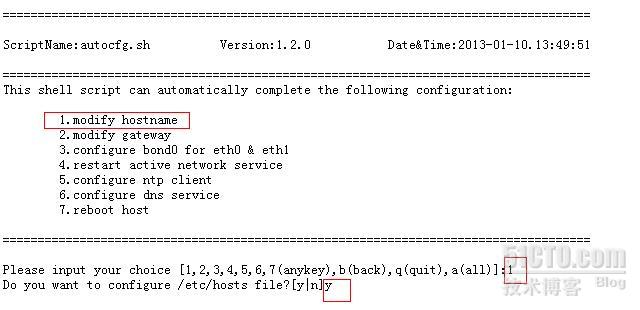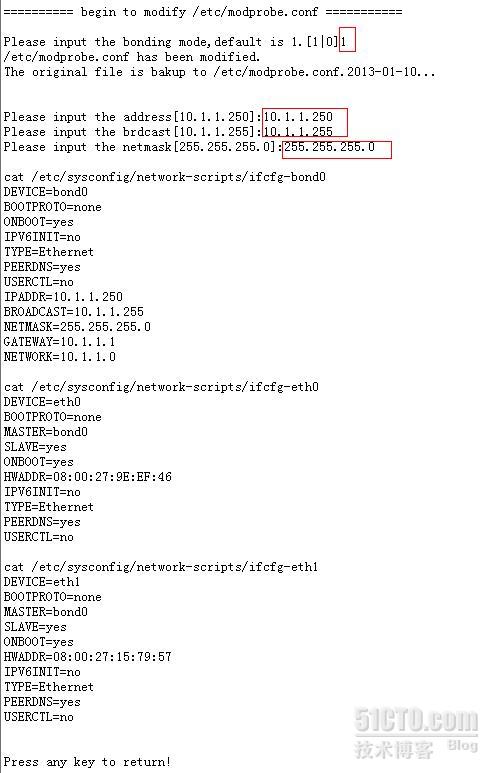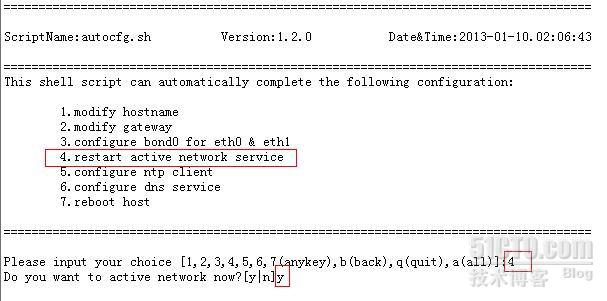每次新装服务器后,总要配置一大堆东西,重复过来,重复过去,我这个人就是不喜欢把时间浪费在相同的事情上面,所以果断写了一个脚本,自动修改主机名,网关,双网卡绑定(包括重置IP地址功能),重启网络,自动配置ntp时间同步服务,自动配置dns服务。由于修改主机名需要重启生效,所以在最后加了重启选项。当所有配置完毕,可以按7完成重启。
将脚本拷贝到服务器任意路径,赋权chmod +x autocfg.sh,然后./autocfg.sh 执行脚本即可。这个脚本我已经在虚拟机上测试过了,可以达到正确效果,希望可以为以后生产环境的配置带来方便,当然可能会有潜在的bug,由于时间问题,没有考虑太多的捕获异常。只要根据提示操作,是可以正确执行的。
不罗嗦,直奔主题,献上脚本:
- #!/bin/bash
- #Initialize server
- #write by xiaojing.zhao
- #2013.1.5
- menu()
- {
- clear
- scriptname="autocfg.sh"
- version=1.2.0
- date=`date +%F.%T`
- cat <
- ====================================================================================
- ScriptName:$scriptname Version:$version Date&Time:$date
- ====================================================================================
- This shell script can automatically complete the following configuration:
- 1.modify hostname
- 2.modify gateway
- 3.configure bond0 for eth0 & eth1
- 4.restart active network service
- 5.configure ntp client
- 6.configure dns service
- 7.reboot host
- ====================================================================================
- MENULIST
- echo -n "Please input your choice [1,2,3,4,5,6,7(anykey),b(back),q(quit),a(all)]:"
- read choice
- }
- hw_eth0=`ifconfig eth0 | grep -i hwaddr | awk '{print $5}'`
- hw_eth1=`ifconfig eth1 | grep -i hwaddr | awk '{print $5}'`
- ####################################################################################
- get_ipaddr()
- {
- ipaddra=`ifconfig -a | grep inet | grep -v inet6 | grep -v 127.0.0.1 | awk '{print $2}'`
- #nw=`ifconfig -a | grep inet | grep -v inet6 | grep -v 127.0.0.1 | awk '{print $2}' | awk -F : '{print $2}' | awk -F . '{print $1"."$2"."$3"."0}'`
- echo "IPADDR=${ipaddra#*:}" >/etc/sysconfig/network-scripts/ifcfg-tmpip
- for i in tmpip bond0 eth0 eth1
- do
- ipaddrb=`grep ^IPADDR /etc/sysconfig/network-scripts/ifcfg-$i 2>/dev/null`
- if [ ! "${ipaddrb#*=}" = "" ]
- then
- ipaddr=${ipaddrb#*=}
- break
- fi
- done
- rm -f /etc/sysconfig/network-scripts/ifcfg-tmpip 2>/dev/null
- if [ "$ipaddr" = "" ]
- then
- echo "This hosts has not a valid ip address"
- while [ "$ipaddr" = "" ]
- do
- echo -n "Please input the address:"
- read ipaddr
- done
- else
- echo -n "Please input the address[$ipaddr]:"
- read ipaddr1
- if [ ! "$ipaddr1" = "" ]
- then
- ipaddr=$ipaddr1
- fi
- fi
- nw=`echo $ipaddr | awk -F . '{print $1"."$2"."$3"."0}'`
- gw=`echo $ipaddr | awk -F . '{print $1"."$2"."$3"."1}'`
- }
- ####################################################################################
- get_brcast()
- {
- brcasta=`ifconfig -a | grep inet | grep -v inet6 | grep -v 127.0.0.1 | awk '{print $3}'`
- echo "BROADCAST=${brcasta#*:}" >>/etc/sysconfig/network-scripts/ifcfg-tmpip
- for i in tmpip bond0 eth0 eth1
- do
- brcastb=`grep ^BROADCAST /etc/sysconfig/network-scripts/ifcfg-$i 2>/dev/null`
- if [ ! "${brcastb#*=}" = "" ]
- then
- brcast=${brcastb#*=}
- break
- fi
- done
- rm -f /etc/sysconfig/network-scripts/ifcfg-tmpip 2>/dev/null
- if [ "$brcast" = "" ]
- then
- echo "This hosts has not a valid broadcast"
- while [ "$brcast" = "" ]
- do
- echo -n "Please input the brdcast:"
- read brcast
- done
- else
- echo -n "Please input the brdcast[$brcast]:"
- read brcast1
- if [ ! "$brcast1" = "" ]
- then
- brcast=$brcast1
- fi
- fi
- }
- ####################################################################################
- get_ntmask()
- {
- ntmaska=`ifconfig -a | grep inet | grep -v inet6 | grep -v 127.0.0.1 | awk '{print $4}'`
- echo "NETMASK=${ntmaska#*:}" >>/etc/sysconfig/network-scripts/ifcfg-tmpip
- for i in tmpip bond0 eth0 eth1
- do
- ntmaskb=`grep ^NETMASK /etc/sysconfig/network-scripts/ifcfg-$i 2>/dev/null`
- if [ ! "${ntmaskb#*=}" = "" ]
- then
- ntmask=${ntmaskb#*=}
- break
- fi
- done
- rm -f /etc/sysconfig/network-scripts/ifcfg-tmpip 2>/dev/null
- if [ "$ntmask" = "" ]
- then
- echo "This hosts has not a valid ip netmask"
- while [ "$ntmask" = "" ]
- do
- echo -n "Please input the netmask:"
- read ntmask
- done
- else
- echo -n "Please input the netmask[$ntmask]:"
- read ntmask1
- if [ ! "$ntmask1" = "" ]
- then
- ntmask=$ntmask1
- fi
- fi
- }
- ####################################################################################
- gateway()
- {
- echo -n "Do you want to configure GATEWAY?[y|n]"
- read myselect
- if [[ "$myselect" = "y" || "$myselect" = "Y" ]]
- then
- unset myselect
- clear
- orifile=/etc/sysconfig/network
- newfile=/root/network
- if ! grep GATEWAY $orifile >/dev/null
- then
- while [ "$gw" = "" ]
- do
- echo -n "Please input GATEWAY:"
- read gw
- done
- else
- echo -n "`grep GATEWAY $orifile`,Please input new GATEWAY:"
- read gw
- fi
- if [ ! "$gw" = "" ]
- then
- #sed "/GATEWAY/d" $orifile | sed "$ a\GATEWAY=$gw" >$newfile
- #the bellow line is better,more fast
- (sed "/GATEWAY/d" $orifile;echo GATEWAY=$gw) >$newfile
- cp $newfile $orifile
- fi
- echo -e "\nThe new $orifile file's content:\n"
- cat $orifile
- echo
- fi
- echo
- }
- ####################################################################################
- hosts()
- {
- echo -n "Do you want to configure /etc/hosts file?[y|n]"
- read myselect
- if [[ "$myselect" = "y" || "$myselect" = "Y" ]]
- then
- unset myselect
- clear
- get_ipaddr
- cp /etc/hosts /root/hosts.`date +%F-%T`
- egrep -v '^([0-9]|[0-9][0-9]|1[0-9][0-9]|2[0-4][0-9]|25[0-5])\.([0-9]|[0-9][0-9]|1[0-9][0-9]|2[0-4][0-9]|25[0-5])\.([0-9]|[0-9][0-9]|1[0-9][0-9]|2[0-4][0-9]|25[0-5])\.([2-9]|[0-9][0-9]|1[0-9][0-9]|2[0-4][0-9]|25[0-5])' /etc/hosts >/root/hosts.txt
- mv /root/hosts.txt /etc/hosts
- echo -n "Please input your hostname[eg:xxxx.aeonlife.com.cn]:"
- read line_hostname
- hname=`echo $line_hostname | awk -F . '{print $1}'`
- sed "/$ipaddr/d" /etc/hosts | sed "$ a\\$ipaddr $line_hostname $hname" >/root/hosts
- cp /root/hosts /etc/hosts
- sed -i "/HOSTNAME/c\HOSTNAME=$line_hostname" /etc/sysconfig/network
- echo -e "\nThe new /etc/hosts file's content:\n"
- cat /etc/hosts
- echo
- fi
- echo
- }
- ####################################################################################
- bond()
- {
- echo -n "Do you want to configure modprobe.conf for bonding?[y|n]"
- read myselect
- if [[ "$myselect" = "y" || "$myselect" = "Y" ]]
- then
- unset myselect
- clear
- echo -e "========== begin to modify /etc/modprobe.conf ===========\n"
- filename=/etc/modprobe.conf
- newfile=/root/modprobe.conf
- #cmdfile=/tmp/change_modprobe.conf.sh
- grep bond0 /etc/modprobe.conf >/dev/null
- if [ $? = 1 ]
- then
- echo -n "Please input the bonding mode,default is 1.[1|0]"
- read bmode
- if [ "$bmode" = "" ];then bmode=1;fi
- cat $filename >$newfile
- echo "alias bond0 bonding" >>$newfile
- echo "options bond0 miimon=100 mode=1" >>$newfile
- mv $filename $filename.`date +%F-%T`
- sed "s/mode=1/mode=$bmode/" $newfile >$filename
- echo "$filename has been modified."
- echo "The original file is bakup to $filename.`date +%F`..."
- else
- echo "This hosts has been using bonding mode,nothing to changed."
- echo "The $filename file's content:"
- cat /etc/modprobe.conf
- fi
- echo
- echo
- orieth0=/etc/sysconfig/network-scripts/ifcfg-eth0
- orieth1=/etc/sysconfig/network-scripts/ifcfg-eth1
- oribond=/etc/sysconfig/network-scripts/ifcfg-bond0
- neweth0=/root/ifcfg-eth0
- neweth1=/root/ifcfg-eth1
- newbond=/root/ifcfg-bond0
- if [ -f $oribond ]
- then
- cp $oribond $newbond.`date +%F-%T`
- fi
- if [[ ! ( ! "$ipaddr" = "" && ! "$brcast" = "" && ! "$netmask" = "" ) ]]
- then
- get_ipaddr
- get_brcast
- get_ntmask
- fi
- echo "DEVICE=bond0" >$oribond
- echo "BOOTPROTO=none" >>$oribond
- echo "ONBOOT=yes" >>$oribond
- echo "IPV6INIT=no" >>$oribond
- echo "TYPE=Ethernet" >>$oribond
- echo "PEERDNS=yes" >>$oribond
- echo "USERCTL=no" >>$oribond
- echo "IPADDR=$ipaddr" >>$oribond
- echo "BROADCAST=$brcast" >>$oribond
- echo "NETMASK=$ntmask" >>$oribond
- echo "GATEWAY=$gw" >>$oribond
- echo "NETWORK=$nw" >>$oribond
- if [ -f $orieth0 ]
- then
- cp $orieth0 $neweth0.`date +%F-%T`
- fi
- if [ -f $orieth1 ]
- then
- cp $orieth1 $neweth1.`date +%F-%T`
- fi
- echo "DEVICE=eth0" >$orieth0
- echo "BOOTPROTO=none" >>$orieth0
- echo "MASTER=bond0" >>$orieth0
- echo "SLAVE=yes" >>$orieth0
- echo "ONBOOT=yes" >>$orieth0
- echo "HWADDR=$hw_eth0" >>$orieth0
- #sed -i '/HWADDR/c\HWADDR='$hw_eth0'' $orieth0
- echo "IPV6INIT=no" >>$orieth0
- echo "TYPE=Ethernet" >>$orieth0
- echo "PEERDNS=yes" >>$orieth0
- echo "USERCTL=no" >>$orieth0
- echo "DEVICE=eth1" >$orieth1
- echo "BOOTPROTO=none" >>$orieth1
- echo "MASTER=bond0" >>$orieth1
- echo "SLAVE=yes" >>$orieth1
- echo "ONBOOT=yes" >>$orieth1
- echo "HWADDR=$hw_eth1" >>$orieth1
- #sed -i '/HWADDR/c\HWADDR='$hw_eth1'' $orieth1
- echo "IPV6INIT=no" >>$orieth1
- echo "TYPE=Ethernet" >>$orieth1
- echo "PEERDNS=yes" >>$orieth1
- echo "USERCTL=no" >>$orieth1
- echo -e "\ncat $oribond"
- cat $oribond
- echo -e "\ncat $orieth0"
- cat $orieth0
- echo -e "\ncat $orieth1"
- cat $orieth1
- echo
- fi
- echo
- }
- ####################################################################################
- ntp()
- {
- echo -n "Do you want to configure ntp client?[y|n]"
- read myselect
- if [[ "$myselect" = "y" || "$myselect" = "Y" ]]
- then
- unset myselect
- clear
- orifile=/var/spool/cron/root
- newfile=/root/root
- if [ -f $orifile ]
- then
- sed "/ntpdate/d" $orifile > $newfile
- else
- touch $orifile
- fi
- if grep ntpdate $orifile > /dev/null
- then
- for i in `sed -n '/ntpdate/p' $orifile | awk '{print $7}'`
- do
- ((num++))
- echo -n "Please input the new ntp server ip-addr. server $num's ip [$i]:"
- #read ntpip[$num]
- read ntpip
- if [ "$ntpip" = "" ]
- then
- ntpip=$i
- fi
- echo "$num * * * * /usr/sbin/ntpdate $ntpip" >> $newfile
- done
- unset num
- else
- echo "You can assign max two ntp server's ip!"
- echo
- for ((i=0;i<2;i++))
- do
- echo -n "Please input the new ntp server ip-addr:"
- read ntpip
- if [ ! "$ntpip" = "" ]
- then
- echo "$i * * * * /usr/sbin/ntpdate $ntpip" >> $newfile
- fi
- done
- fi
- cp $newfile $orifile
- echo
- echo "The new root's crontab is"
- crontab -l
- /usr/sbin/ntpdate $ntpip
- echo
- echo
- fi
- echo
- }
- ####################################################################################
- dns()
- {
- echo -n "Do you want to configure dns service?[y|n]"
- read myselect
- if [[ "$myselect" = "y" || "$myselect" = "Y" ]]
- then
- unset myselect
- clear
- echo -e "You can assign max two dns server's ip!\n"
- for ((i=0;i<2;i++))
- do
- echo -n "Please input the new dns server ip-addr:"
- read dnsip
- echo "nameserver "$dnsip >> /etc/resolv.conf
- done
- fi
- echo
- }
- ####################################################################################
- autostart()
- {
- echo -n "Do you want to active network now?[y|n]"
- read myselect
- if [[ "$myselect" = "y" || "$myselect" = "Y" ]]
- then
- unset myselect
- clear
- service network restart >/dev/null 2>&1
- service network restart
- fi
- echo
- }
- ####################################################################################
- for ((j=1;;j++))
- do
- menu
- case "$choice" in
- "1")
- hosts
- ;;
- "2")
- gateway
- ;;
- "3")
- bond
- ;;
- "4")
- autostart
- ;;
- "5")
- ntp
- ;;
- "6")
- dns
- ;;
- "7") reboot
- ;;
- "8")
- ;;
- "a")
- gateway
- hosts
- bond
- ntp
- dns
- autostart
- exit 0
- ;;
- "b")
- unset choice
- ;;
- "q")
- exit 0
- ;;
- esac
- if [ ! "$choice" = "" ]
- then
- echo "Press any key to return!"
- read
- fi
- done
由于篇幅问题,只选取部分例子的执行效果:
---------------------------------华丽的分割线--------------------------------------
---------------------------------华丽的分割线--------------------------------------
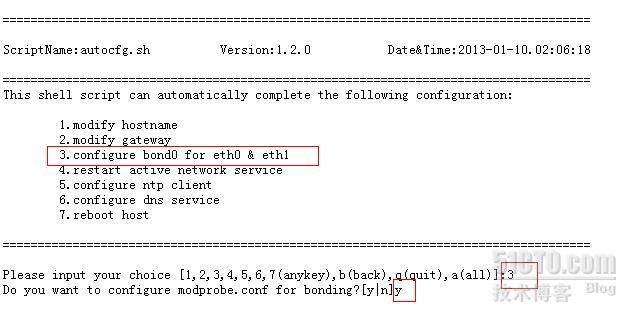 ---------------------------------华丽的分割线--------------------------------------
---------------------------------华丽的分割线--------------------------------------
---------------------------------华丽的分割线--------------------------------------
---------------------------------华丽的分割线--------------------------------------
---------------------------------华丽的分割线--------------------------------------
---------------------------------华丽的分割线--------------------------------------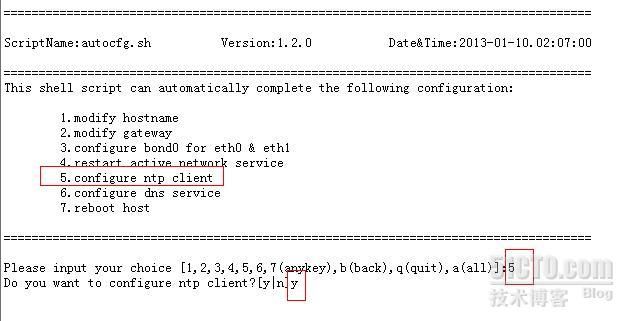
---------------------------------华丽的分割线--------------------------------------
最终完成后,可按7完成重启,因为修改主机名需要重启生效。
这是第二个版本,以后还会根据需要陆续往里加内容。希望这个脚本能给更多奋斗在运维岗位的朋友带来帮助。
